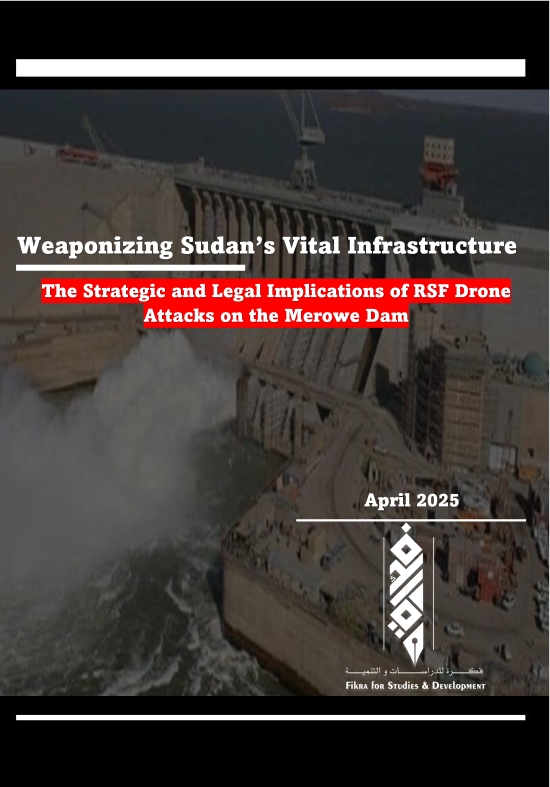Fikra for Studies and Development Releases Report on RSF Drone Strikes Targeting Sudan’s Largest Hydroelectric Dam
Fikra for Studies and Development Releases Report on RSF Drone Strikes Targeting Sudan’s Largest Hydroelectric Dam

22 April 2025
As Sudan’s war enters its second devastating year, Fikra for Studies and Development is releasing a timely and urgent report titled “Weaponizing Sudan’s Vital Infrastructure: The Strategic and Legal Implications of RSF Drone Attacks on the Merowe Dam.”
The report offers a comprehensive documentation of the Rapid Support Forces’ (RSF) systematic use of drone warfare to target the Merowe Dam and Sudan’s broader energy infrastructure—attacks that now threaten not only Sudan’s national stability, but regional security and international legal norms.
Drawing on verified attack timelines, scientific assessment and satellite imaging, the report outlines how drone strikes—many believed to be facilitated through foreign support—have disabled critical components of Sudan’s energy grid. Hospitals have gone dark, water systems have collapsed, and millions face the compounded threats of famine, disease, and displacement in the absence of basic services.
But this is more than a local crisis.
“What is happening in Sudan is not just a humanitarian tragedy—it is a dangerous escalation in how modern proxy warfare is being waged,” said a FikraSD researcher involved in the report. “The silence from the international community is alarming. We are witnessing the use of drones to weaponize basic infrastructure, including a dam holding back 12.5 cubic kilometers of water. And still, this doesn’t trigger global alarm.”
The report calls for international attention and for monitoring and accountability mechanisms to investigate these attacks under international humanitarian law and the Rome Statute, citing clear violations including the unlawful targeting of civilian infrastructure and potential war crimes. It also highlights the urgent need to examine the role of external actors enabling these operations, particularly the use of neighboring territory for the illicit transfer and deployment of advanced military drones.
In a conflict where frontline reporting is often silenced, this report is a call to break the strategic apathy that has allowed these violations to occur without consequence. It is an invitation to policymakers, human rights actors, journalists, and regional stakeholders to see Sudan’s war not as a distant tragedy—but as a frontline in the battle to defend international norms, human rights, and the sanctity of civilian life.
The report offers a comprehensive documentation of the Rapid Support Forces’ (RSF) systematic use of drone warfare to target the Merowe Dam and Sudan’s broader energy infrastructure—attacks that now threaten not only Sudan’s national stability, but regional security and international legal norms.
Drawing on verified attack timelines, scientific assessment and satellite imaging, the report outlines how drone strikes—many believed to be facilitated through foreign support—have disabled critical components of Sudan’s energy grid. Hospitals have gone dark, water systems have collapsed, and millions face the compounded threats of famine, disease, and displacement in the absence of basic services.
But this is more than a local crisis.
“What is happening in Sudan is not just a humanitarian tragedy—it is a dangerous escalation in how modern proxy warfare is being waged,” said a FikraSD researcher involved in the report. “The silence from the international community is alarming. We are witnessing the use of drones to weaponize basic infrastructure, including a dam holding back 12.5 cubic kilometers of water. And still, this doesn’t trigger global alarm.”
The report calls for international attention and for monitoring and accountability mechanisms to investigate these attacks under international humanitarian law and the Rome Statute, citing clear violations including the unlawful targeting of civilian infrastructure and potential war crimes. It also highlights the urgent need to examine the role of external actors enabling these operations, particularly the use of neighboring territory for the illicit transfer and deployment of advanced military drones.
In a conflict where frontline reporting is often silenced, this report is a call to break the strategic apathy that has allowed these violations to occur without consequence. It is an invitation to policymakers, human rights actors, journalists, and regional stakeholders to see Sudan’s war not as a distant tragedy—but as a frontline in the battle to defend international norms, human rights, and the sanctity of civilian life.
________________________________________
📄 Download the full report
For press inquiries, contact: info@fikrasd.com
www.fikrasd.com
📄 Download the full report
For press inquiries, contact: info@fikrasd.com
www.fikrasd.com

